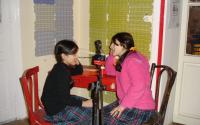31 July 2006Shirin Ebadi and Jody Williams
Israel and Lebanon
As recipients of the Nobel Peace Prize, we watch with stunned disbelief as the fighting in Lebanon and Israel spins out of control, while the humanitarian crisis in Gaza apparently has slipped from public consciousness. The lack of global leadership in the face of this violence affecting hundreds of thousands of civilians is appalling.
The failure of the Group of 8 in July to tackle blatant breaches of international humanitarian law demonstrates a crass unwillingness to put civilian lives above politics. The repeated U.S. vetoes in the UN Security Council, stopping efforts to resolve these crises, are unfortunately predictable. The Bush administration - backed by strong language in the U.S. Congress supporting Israeli military operations - has done nothing to mitigate the overwhelming impact on the civilian population.
The July emergency meeting in Rome, two weeks into the crisis, resulted in nothing tangible. Only the United States, Britain and Israel oppose an immediate cease-fire. With U.S. officials describing the destruction and chaos as the inevitable "birth pangs of a new Middle East," how can they expect anything less than dramatically increased anti-Americanism throughout the Middle East - if not the entire world?
Watching the wholesale destruction of much of Lebanon, it is almost embarrassing to call the Israeli response to the kidnapping of its three soldiers "disproportionate." It is collective punishment of the civilian populations of Gaza and Lebanon. It is collective but personal as we read the sporadic e-mails describing death and destruction that reach us from women colleagues in Lebanon. It is collective but personal as a graduate student at the University of Houston keeps us informed about the impact on her relatives in Gaza.
The deliberate destruction of civilian infrastructure, including roads, bridges, apartment buildings, relief trucks, ports and the airport has resulted in large numbers of civilian casualties. It has prevented civilians from evacuating conflict areas, and hindered provision of humanitarian aid. Hundreds of thousands of refugees - perhaps one out of every five people in Lebanon - are attempting to flee in a country whose exit points have been deliberately destroyed. Much of Beirut has again been reduced to rubble. Hezbollah's increasing attacks against civilian targets in Israel are also heinous and violations of international law.
While we watch the violence being ratcheted up in Lebanon and the north of Israel, the Gaza crisis simmers. The Israeli occupation of Gaza may have changed in form, but the reality is that it maintains control over all aspects of life there. Israel's prime minister, Ehud Olmert, has clearly stated that his soldiers will "operate, enter and pull out as needed." As Israeli attacks intensified in the north, its forces also began distributing leaflets throughout Gaza stating that it would begin bombing houses suspected of being used as weapons caches. They had already destroyed the only power station in Gaza, leaving tens of thousands without water and sewage.
We do not understand how the international community can continue to stand by while entire populations are held hostage in what has been described as "self defense."
No deliberate attacks against civilians by armed groups should be condoned by the international community, either explicitly or implicitly through inaction. Every new attack leaves dead and wounded in its wake. Every new attack makes another woman a widow and more children orphans. Every new attack demonstrates the inability or unwillingness of governments to exercise their moral obligation to stop the violence. Every new attack underscores our collective failure to stop making violence our preferred choice for confronting the problems facing us all.
The UN Security Council must intervene to stop the violence and avoid an escalation of the conflict that could engulf the region in yet more war. It is time for internationally mediated negotiations for comprehensive peace in the Middle East. Such negotiations must include civil society groups, and women from throughout the region. Women and children suffer disproportionately during and after conflict, and women must have a voice in finding meaningful solutions to the violence.
Shirin Ebadi, an Iranian lawyer, received the Nobel Peace Prize in 2003 for her work defending human rights. Jody Williams received the Nobel Peace Prize in 1997 for her work with the International Campaign to Ban Land Mines.






